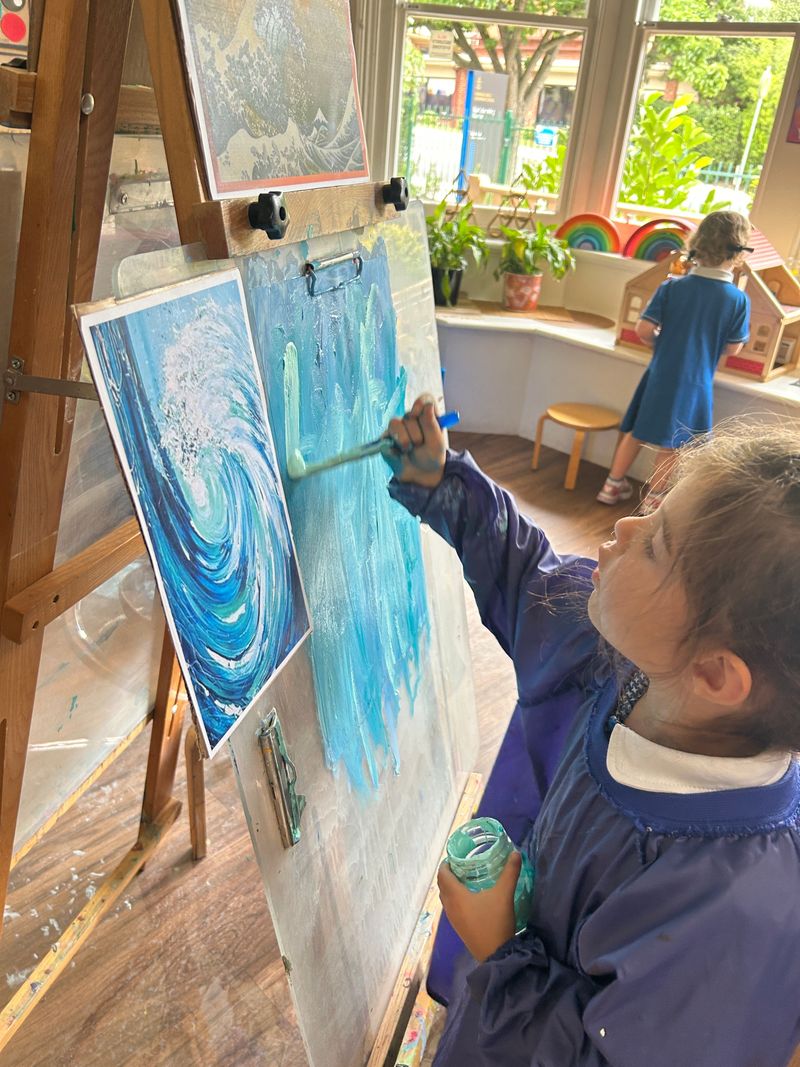Starting school is a big step—for children and their families alike. In our Early Learning Centre (ELC), the journey begins gently and thoughtfully at age three, when children are ready to transition from a world focused solely on themselves, to one that embraces others.
This early foundation sets the stage for a lifelong love of learning, grounded in strong relationships and a supportive community.
Three-year-olds are at a unique developmental stage. They are moving from egocentric thinking towards an awareness of others. It's the perfect time to build social skills, self-awareness, and empathy.
At age three, brain development is rapid and intertwined with social and emotional growth. Which is why secure and nurturing relationships are essential to their learning.
“At this age, children initially form strong attachments to one or two educators,” explains Emily Franceschi, ELC educator at Ivanhoe Girls' Grammar School. “Once comfortable, they gradually expand their social circles from one friend to many, which is entirely appropriate for their development.”
The Centre fosters these secure attachments through consistent routines and predictable daily rhythms, creating a safe and reassuring environment.
Structured routines—like morning meetings, snack time, outdoor play, and the end-of-day ‘magic mats’ ritual—provide comforting milestones throughout the day. These small rituals build a sense of belonging and security, helping children feel grounded and ready to explore.
The learning program at the Ivanhoe Girls' ELC is thoughtfully designed to reflect the unique interests and developmental needs of each child. Observations and conversations with families help educators tailor goals that blend intentional teaching with child-led discovery.
For example, if children show curiosity about houses and homes, the program might include collaborative projects and play activities centered around their interests—encouraging teamwork, concentration, and community belonging.
By weaving in their interests, children stay engaged and motivated, while educators guide them gently towards key developmental milestones.

Social interaction is fundamental at this stage. Children learn by observing and copying their peers—from emotional expressions like anger or joy to practical skills like writing letters or problem-solving. Educators carefully scaffold these moments, helping children build on their abilities step-by-step.
A distinctive feature of the ELC at Ivanhoe Girls' is its focus on the school’s core values—connectedness, bravery, curiosity, vibrancy and kindness—which are woven into daily experiences. For instance, a soft toy called ‘Hero’ helps children talk about moments when they’ve been brave, like trying a new food or facing a fear. These stories and shared experiences foster a strong sense of community and emotional resilience.
Transitioning into early learning is a partnership between families and educators. Home visits early in the school year help build trust and ease children’s adjustment. Meeting teachers in the home environment frames educators as safe, friendly figures—making the school experience feel more familiar and less intimidating.
Ongoing communication through photo updates, family reading visits, and individualized plans ensures each child’s needs are met. Drop-off routines are carefully managed, often with creative strategies—like goodbye rituals or visual cues—to help children feel secure and supported.
The ELC gradually introduces children to structured group activities and routines, preparing them for the expectations of school life. Familiarity with the wider school community—meeting other teachers, visiting classrooms, and participating in specialist lessons—helps children feel connected and confident.
Educators view children as capable and competent learners, encouraging decision-making, problem-solving, and active participation. This approach not only builds cognitive skills but also nurtures independence and self-assurance.
Play is the cornerstone of learning at the ELC. Through play, children explore their interests, make sense of the world around them, and consolidate new knowledge. Whether building a neighbourhood from blocks or acting out family roles, children engage in meaningful, hands-on learning that supports developmental goals.
Educators weave intentional teaching moments into play, responding flexibly to children’s needs and curiosities. This dynamic interplay ensures learning remains joyful, relevant, and deeply connected to each child’s lived experience.
What truly sets the ELC apart is the gentle, relationship-focused approach to starting school. From early visits and ongoing communication to flexible routines and personalized support, the Centre creates a seamless transition that respects each child’s pace and individuality.
"Even before the child commences, we put relationships at the forefront," explains Emily Franceschi. "The partnerships with families, visiting them at home, the interviews. Sometimes I've had so much communication with a child before she starts that when she finally comes to the ELC she's like, "Oh it's you!" This continuity builds confidence and eases the anxiety that can come with change, laying the foundation for a positive and joyful educational journey.
To find out more about the Early Learning Program at Ivanhoe Girls', or to arrange a Tour of the ELC and Junior School, please contact our Admission Team.